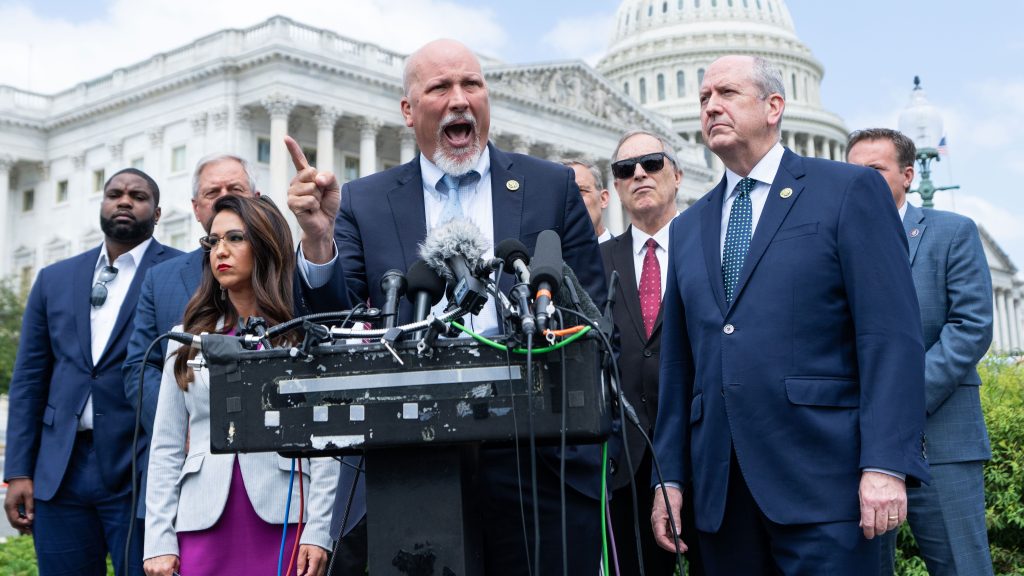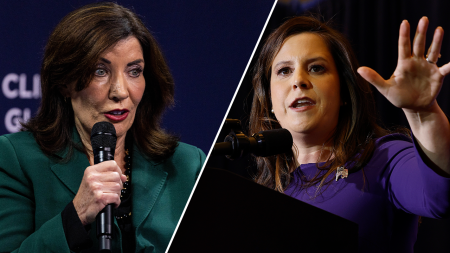The ultra-conservative House Freedom Caucus is pushing for a slimmed-down disaster aid package from President Biden, asking for only what is “absolutely necessary” and to be offset with spending cuts elsewhere. The group is concerned that passing a $100 billion bill would allow Democrats to push through unrelated priorities as the party’s control in Washington begins to shift to Republicans. More than 100 people were killed in North Carolina alone when Hurricane Helene hit the Southeastern U.S., followed by Hurricane Milton hitting Florida and Georgia. Republican lawmakers like Sen. Thom Tillis are advocating for a $100 billion disaster aid package to assist with recovery efforts, but fiscal conservatives in the Freedom Caucus are wary of granting such a hefty request without cutting costs elsewhere.
The House Freedom Caucus, including Policy Chair Rep. Chip Roy, firmly opposes the idea of a $100 billion disaster aid package without proper offsets to prevent further increasing the national debt. The group is advocating for a more targeted approach to providing relief for hurricane victims and farmers. While some lawmakers like Rep. Chuck Edwards from North Carolina are in contact with House leaders about the disaster aid bill, details are still being crafted. Congressional leaders are also in talks about a continuing resolution (CR) to avoid a partial government shutdown by the Dec. 20 deadline.
Speaker Mike Johnson from Louisiana, who discussed disaster aid and government funding with the House Freedom Caucus, emphasized the importance of assessing the requests in the aid package to ensure they are directly related to disaster relief. The initial request from President Biden was $116.5 billion, but lawmakers are working to determine the proportionate amount needed for various areas of assistance. Despite the serious damage caused by the hurricanes, there is caution in approving such a large financial request without careful scrutiny of each line item. Lawmakers are working diligently to prioritize the needs of disaster-stricken communities while avoiding unnecessary expenditures.
Republican lawmakers like Sen. Tillis stress the urgency of providing adequate disaster aid to help with long-term recovery efforts in states affected by hurricanes. The devastating impact of the storms has left communities in need of substantial assistance, prompting calls for a significant aid package. However, concerns from the House Freedom Caucus about the cost and potential fiscal implications of a large aid package have created a divide among lawmakers. The negotiations surrounding the disaster aid bill and the CR are ongoing, with discussions focused on finding a balance between meeting the immediate needs of disaster victims and maintaining responsible fiscal practices.
The push for a slimmed-down disaster aid package from the House Freedom Caucus reflects a broader debate within the Republican Party about the appropriate response to natural disasters and the role of government assistance. While lawmakers are united in their commitment to assisting communities affected by hurricanes, they differ on the best approach to providing that assistance. The focus on offsets and fiscal responsibility highlights the ongoing tension between conservative principles and the necessity of responding effectively to emergencies. As negotiations continue, lawmakers will need to find common ground to ensure that vital aid reaches those in need while balancing budgetary constraints and long-term economic stability.
In the midst of ongoing discussions about disaster aid and government funding, Speaker Johnson and other Republican leaders are working to navigate the complexities of responding to natural disasters and securing necessary financial resources. The commitment to assessing the aid requests carefully and ensuring that taxpayer dollars are used effectively underscores the importance of responsible governance. As Congress grapples with competing priorities and political divisions, the ultimate goal remains clear: providing timely and sufficient assistance to disaster-stricken communities while safeguarding fiscal integrity and long-term sustainability. The decisions made in the coming weeks will have significant implications for the recovery efforts in regions affected by hurricanes and will shape the broader debate about federal disaster response and fiscal policy moving forward.










